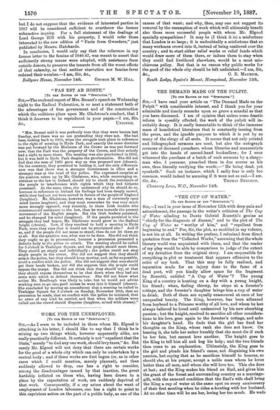WORK FOR THE UNEMPLOYED.
fTe Tax Erma or vs: "Sesevavon,"J
Sns,—As I seem to be included in those whom Mr. Elgood is attacking in his letter, I should like to say that I think he is mixing up two things which, however apparently alike, are really practically different. It certainly is not" expedient that the State," merely "to find any one work, should levy taxes," &c. But surely Mr. Elgood will not deny that there are certain works for the good of a whole city which can only be undertaken by a central body ; and if these works are first begun (or, as in other cases which I could mention, merely planned), and then suddenly allowed to drop, one has a right to consider, among the disadvantages caused by that inaction, the great hardship inflicted on those who, having been drawn to a place by the expectation of work, are suddenly deprived of that work. Consequently, if a cry arises about the want of employment of London labourers, one has a right to point to this capricious action on the part of a public body, as one of the causes of that want; and why, then, may one not suggest its removal by the resumption of work which will ultimately benefit also those more successful people with whom Mr. Elgood specially sympathises P It may be (I think it is) a misfortune that London is so large; it is undoubtedly a misfortune that so many workmen crowd into it, instead of being scattered over the country ; and to start either relief works or relief funds which would draw more of them there, or induce them to stay when they could find livelihood elsewhere, would be a most mis- chievous policy. But that is no reason why public works for the good of the whole city should be left unfinished.—I am, Sir,
&c., C. E. MAURICE. South Lodge, Squire's Mount, Hampstead, November 131k.























































 Previous page
Previous page